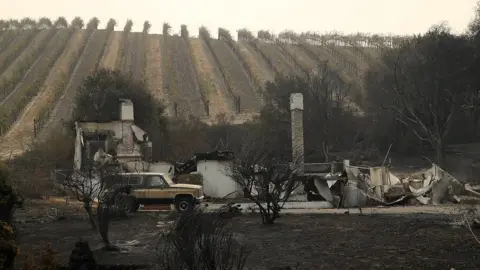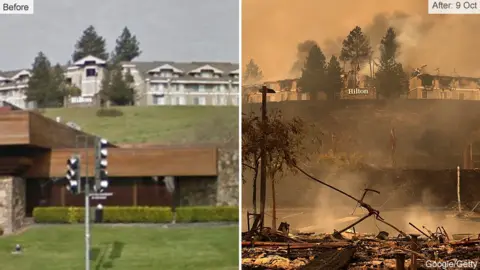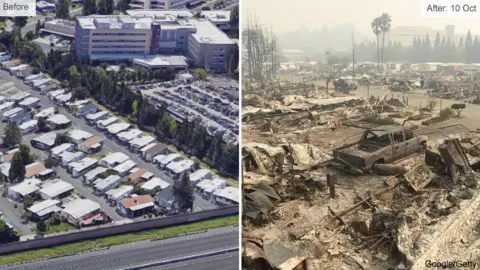Wildfires in California: Wine industry counts cost of disaster
 Getty Images
Getty ImagesCall it the grapes of wrath - the California wildfires have struck at the heart of wine country, razing at least five wineries and damaging others.
Most of this season's grapes have already been harvested, which limits possible damage from smoke.
But many business owners have not been able to inspect their properties since the areas remain evacuated.
"We just don't know yet," said John Aguirre, president of the California Association of Winegrape Growers.
"It's not clear how many vineyards have been damaged and to what extent they can be rehabilitated."
The wildfires are the deadliest in California since 2003 and among the worst in the state's history. At least 21 people have been killed and hundreds of people are missing.
Napa and Sonoma counties, where the terror on the terroir struck hardest, are home to about 10% wine grapes grown in California, according to the Wine Institute.
They're also home to about a fifth of the state's 4,700 wineries, which buy and process grapes ,and welcome millions of tourists each year.
While California is accustomed to risks from wildfires, the severity of these blazes is "unprecedented" for the wine industry, Mr Aguirre said.
At least five wineries have suffered total or very significant losses, and 11 more have reported damage, according to Napa Valley Vintners.
The organisation had not heard reports from about a dozen wineries in particularly vulnerable areas.
About 90% of grapes had already been harvested.

A decline in tourism and damage to vineyards are likely to add significantly to costs, once the damage is fully understood, said Rob McMillan, founder of the wine division for Silicon Valley Bank.
For individual businesses, the fires could be devastating as destroyed vines take about four years to grow back.
Mr McMillan said consumers, however, can rest easy: the fires are unlikely to lead to a wider rise in prices for California wine.
"There's plenty of wine. There's plenty of choices," he said. "But it is going to be very painful for [individual] vineyard owners and winery owners."

Before and after
 Google/Getty
Google/Getty Google/Getty
Google/Getty